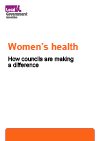
Introduction
Although women live longer than men on average, they spend a significantly greater proportion of their lives in ill health and disability compared to men. To combat this, the government in England has published its first ever Women’s Health Strategy.
It makes clear the status-quo is failing women. It says there is not enough focus placed on women-specific issues such as miscarriage or menopause, while all too often women face “obstacles” getting the care and support they need from core services.
The strategy sets out a six-point plan to tackle the problems, calling for better representation to ensure women’s voices are heard, improved access to services, better information and education, greater understanding of how women’s health affects their experience in the workplace and improved data gathering and research.
In the foreword to the strategy, the Women’s Health Ambassador for England, Professor Dame Lesley Regan says it is time to “reset the dial”. But she says to achieve sustainable change and improvement the drive must go beyond just the NHS. Every sector in society has a role to play, she believes.
Local government is already rising to the challenge. Before the strategy was published plenty of councils had started developing new programmes and working with their partners to ensure women’s health is a priority in all they do.
The case studies show the breadth of the work going on, from Lancashire’s push to create a menopause-friendly environment for staff to Newcastle’s social media campaign to get hard-to-reach women to come forward for cervical screening.
Others, such as Surrey, are doing great working helping women caught up in the criminal justice system, while Liverpool has set up hubs to improve access to reproductive and sexual health services. If the ambitions of the strategy are to be achieved, local government will have a critical role.












